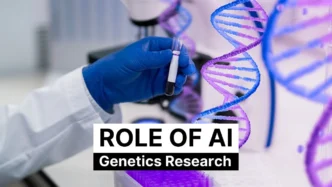In recent years, genetics has emerged as one of the most dynamic fields in both medical research and education. With the advent of artificial intelligence (AI) and other advanced technologies, the field of genetics is undergoing a complete transformation.
These innovations are not only accelerating research but are also reshaping the way genetics is taught and understood. There are many points in mind to talk about, but we will try to have a detailed talk on how Artificial intelligence and other technologies have reshaped the way genetics education.
The Role of AI in Genetic Research
AI in genetics is increasingly playing a crucial role in its research. Traditional genetic research methods often involved intensive processes, limited by the sheer complexity of human genetics. However, AI algorithms, particularly those based on machine learning and deep learning, are capable of analyzing vast datasets far more efficiently than human researchers.
Data Analysis and Interpretation
As we are aware of the fact that data related to genetics is quite large in some cases. AI can process and interpret such large amounts of genetic data, identifying patterns that would be impossible to detect manually. This is particularly useful in genome-wide association studies (GWAS), where AI can uncover genetic variants associated with specific diseases.
Predictive Modeling in Genetics
AI can also be used to develop predictive models that forecast the likelihood of an individual developing certain genetic conditions. These models can incorporate not just genetic information, but also environmental and lifestyle factors, offering a more comprehensive prediction.
Technological Advancements in Genetics Education
The integration of AI in genetics is paralleled by significant advancements in educational technologies. These tools are enhancing the learning experience for students and researchers alike, making complex genetic concepts more accessible.
Online Tools that Help in Accurate Genetic Predictions
Online tools are transforming genetics education by providing students and educators with web-based applications that simplify and expedite genetic work. These tools include allele frequency calculators, Punnett square generators (take this one as an example), and genotypic ratio calculators, which automate complex calculations, making it easier to understand and predict genetic outcomes. By integrating these tools into the curriculum, educators can enhance learning efficiency and accuracy, allowing students to focus more on mastering genetic concepts rather than manual computations.
Interactive Learning Platforms
Modern educational platforms utilize AI to create personalized learning experiences. For instance, adaptive learning systems can adjust the difficulty of material based on a student’s performance, ensuring that learners remain engaged and challenged.
Virtual Laboratories
Virtual and augmented reality (VR/AR) are increasingly used in genetics education, allowing students to simulate experiments and visualize genetic processes in 3D. This hands-on approach helps to ease abstract concepts and fosters a deeper understanding of genetic mechanisms. although they are not so popular and in large amount but we can expect the number gets increased with the passage of time.
AI-Driven Genetic Prediction Models
One of the most promising applications of AI in genetics is the development of AI-driven genetic prediction models. These models can predict an individual’s risk for a variety of genetic conditions, from common diseases like diabetes to rare genetic disorders.
Polygenic Risk Scores (PRS)
AI algorithms are being used to calculate PRS, which quantify an individual’s genetic predisposition to certain diseases based on multiple genetic variants. AI enhances the accuracy of these scores by analyzing vast genetic datasets and identifying subtle interactions between genes.
Personalized Medicine
AI-driven genetic predictions are a cornerstone of personalized medicine, where treatments and preventive strategies are tailored to an individual’s genetic makeup. By predicting how a patient might respond to a particular drug or therapy, AI can help in developing personalized treatment plans that improve outcomes and reduce adverse effects.
Ethical and Privacy Considerations
As AI continues to advance genetic predictions, it raises important ethical and privacy concerns. The ability to predict an individual’s genetic risks with high accuracy could lead to discrimination or stigmatization. There is also the issue of data privacy, as genetic information is highly sensitive.
Ethical Frameworks
The development of ethical frameworks is essential to guide the use of AI in genetic predictions. These frameworks should ensure that AI applications are used responsibly and that the benefits of genetic predictions are accessible to all, without worsening existing inequalities.
Regulatory Oversight
Governments and regulatory bodies must establish clear guidelines on the use of AI in genetics, particularly concerning data protection and patient consent. This will help to safeguard against the misuse of genetic information and ensure that individuals retain control over their genetic data.
The future of genetics is linked to the development of AI and other advanced technologies. These innovations are revolutionizing both genetic research and education, making it possible to analyze genetic data with unprecedented accuracy and to predict genetic risks with greater precision. But as we continue to integrate AI into genetics, it is crucial to address the ethical and privacy challenges that arise, ensuring that these technologies are used responsibly.

